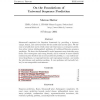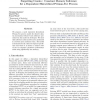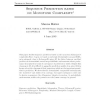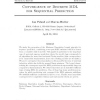JMLR
2010
15 years 15 days ago
2010
The problem is sequence prediction in the following setting. A sequence x1, . . . , xn, . . . of discrete-valued observations is generated according to some unknown probabilistic ...
102
click to vote
CORR
2006
Springer
15 years 2 months ago
2006
Springer
Solomonoff completed the Bayesian framework by providing a rigorous, unique, formal, and universal choice for the model class and the prior. We discuss in breadth how and in which...
108
click to vote
ICML
2010
IEEE
15 years 3 months ago
2010
IEEE
We propose a novel dependent hierarchical Pitman-Yor process model for discrete data. An incremental Monte Carlo inference procedure for this model is developed. We show that infe...
AGI
2008
15 years 3 months ago
2008
Sequence prediction is a key component of intelligence. This can be extended to define a game between intelligent agents. An analog of a result of Legg shows that this game is a co...
129
click to vote
COLT
2003
Springer
15 years 7 months ago
2003
Springer
This paper studies sequence prediction based on the monotone Kolmogorov complexity Km=−log m, i.e. based on universal deterministic/one-part MDL. m is extremely close to Solomon...
COLT
2004
Springer
15 years 7 months ago
2004
Springer
We study the properties of the Minimum Description Length principle for sequence prediction, considering a two-part MDL estimator which is chosen from a countable class of models....
105
click to vote
ATAL
2005
Springer
15 years 7 months ago
2005
Springer
Robust sequence prediction is an essential component of an intelligent agent acting in a dynamic world. We consider the case of near-future event prediction by an online learning ...
146
click to vote
Publication
We present a simple, effective generalisation of variable order Markov
models to full online Bayesian estimation. The mechanism used is close
to that employed in context tree wei...




